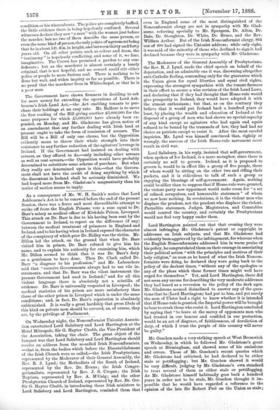Lord Hartington pointed out that that evening they were almost
infringing Mr. Gladstone's patent or copyright in addresses on Irish subjects, and that Mr. Gladstone had evidently been aggrieved by the infringement, for whereas when the English Nonconformists addressed him in warm praise of his policy, he congratulated them on their courage in associating their political action "with the principles and motives of their holy religion," as soon as he heard of what the Irish Noncon- formists were doing, he declared they were going back to the policy of the darkest times, "without any of the apologies or any of the pleas which those former times might well have urged for themselves." Yet, said Lord Hartington, there did not seem any excuse for describing the very moderate addresses they had heard as a reversion to the policy of the dark ages. Mr. Gladstone seemed disinclined to answer any of the ques- tions that he (Lord Hartington) had put to him, and yet surely the men of Ulster had a right to know whether it is intended that if Home-rule is granted, the Imperial power will be brought to bear to crush those who resist it. Lord Hartington concluded by saying that "to leave at the mercy of opponents men who had trusted in our honour and confided in our protection, would be an act of disgrace, of faithlessness, of dereliction of duty, of which I trust the people of this country will never be guilty."


















































 Previous page
Previous page